-
 Bitcoin
Bitcoin $83,649.7703
-1.06% -
 Ethereum
Ethereum $1,818.4708
-2.72% -
 Tether USDt
Tether USDt $1.0000
0.01% -
 XRP
XRP $2.0495
-3.21% -
 BNB
BNB $597.8591
-1.20% -
 Solana
Solana $118.6021
-5.26% -
 USDC
USDC $1.0000
0.01% -
 Dogecoin
Dogecoin $0.1642
-3.52% -
 Cardano
Cardano $0.6526
-2.99% -
 TRON
TRON $0.2343
-0.56% -
 Toncoin
Toncoin $3.7346
-7.00% -
 UNUS SED LEO
UNUS SED LEO $9.4260
0.63% -
 Chainlink
Chainlink $12.9796
-3.63% -
 Stellar
Stellar $0.2617
-1.79% -
 Avalanche
Avalanche $18.3920
-4.15% -
 Sui
Sui $2.3105
-2.61% -
 Shiba Inu
Shiba Inu $0.0...01222
-0.74% -
 Hedera
Hedera $0.1630
-1.67% -
 Litecoin
Litecoin $83.6143
1.85% -
 Polkadot
Polkadot $4.0068
-2.05% -
 MANTRA
MANTRA $6.3564
2.37% -
 Bitcoin Cash
Bitcoin Cash $306.7380
0.76% -
 Bitget Token
Bitget Token $4.5736
-0.36% -
 Dai
Dai $1.0001
0.01% -
 Ethena USDe
Ethena USDe $0.9998
0.00% -
 Pi
Pi $0.6284
-6.81% -
 Hyperliquid
Hyperliquid $11.9330
-10.11% -
 Monero
Monero $213.7810
-0.49% -
 Uniswap
Uniswap $5.9757
-2.02% -
 Aptos
Aptos $5.2294
-1.01%
What are the risks of buying a Bitcoin ETF?
Bitcoin ETFs offer exposure to Bitcoin's price without direct ownership, but they come with risks like market volatility, regulatory uncertainty, and security threats.
Mar 27, 2025 at 03:21 am
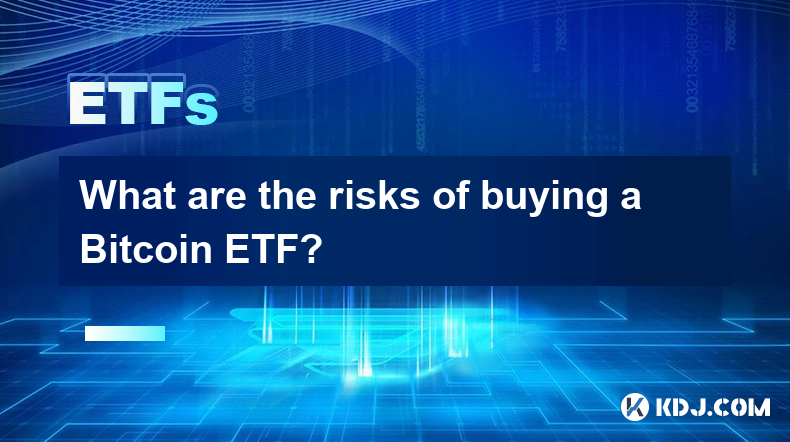
Understanding the Potential Downsides of Bitcoin ETF Investment
A Bitcoin Exchange-Traded Fund (ETF) seeks to track the price of Bitcoin, offering investors exposure to the cryptocurrency without directly holding it. While offering convenience, several risks are inherent in investing in a Bitcoin ETF. These risks stem from both the nature of Bitcoin itself and the structure of the ETF. Understanding these risks is crucial before investing.
Market Volatility and Price Fluctuations
Bitcoin's price is notoriously volatile. Sharp price swings are common, and these fluctuations can significantly impact the value of a Bitcoin ETF. A sudden drop in Bitcoin's price can lead to substantial losses for ETF investors, even in a short timeframe. This volatility is amplified by factors like regulatory uncertainty, market sentiment, and technological developments within the cryptocurrency space.
Regulatory Uncertainty and Legal Challenges
The regulatory landscape surrounding cryptocurrencies, including Bitcoin, remains uncertain in many jurisdictions. Changes in regulations could negatively impact the operation and performance of a Bitcoin ETF. Legal challenges, such as those related to the classification of Bitcoin as a security or commodity, could also affect its price and the ETF's ability to operate effectively.
Security Risks and Hacking
While a Bitcoin ETF mitigates some of the risks associated with directly holding Bitcoin (like losing your private keys), it doesn't eliminate all security concerns. The ETF itself could be a target for hacking or cyberattacks, potentially leading to losses for investors. The underlying custodian holding the Bitcoin reserves is also subject to security risks. Thorough due diligence on the ETF's security protocols is essential.
Counterparty Risk and Fund Management
Investing in a Bitcoin ETF exposes investors to counterparty risk. This refers to the risk that the ETF issuer or the custodian holding the Bitcoin might default on its obligations. Furthermore, the fund manager's investment strategies and fees need careful consideration. Poor fund management can lead to underperformance relative to the Bitcoin price.
Liquidity Risk and Trading Costs
While ETFs generally offer better liquidity than directly trading Bitcoin, liquidity risk still exists, particularly during periods of high market volatility or low trading volume. This can make it difficult to buy or sell shares of the ETF at the desired price. Additionally, trading costs, including commissions and expense ratios, can erode returns over time.
Operational Risks and Internal Controls
Like any investment vehicle, Bitcoin ETFs are susceptible to operational risks. These include errors in pricing, calculation of net asset value (NAV), and other operational aspects of the fund. Effective internal controls are crucial to mitigate these risks. Investors should review the ETF's prospectus for details on its operational structure and risk management procedures.
Lack of Diversification and Concentration Risk
Investing solely in a Bitcoin ETF means concentrating your investment in a single, volatile asset. This lack of diversification increases the overall risk of your portfolio. A significant drop in Bitcoin's price could severely impact your investment returns. Diversification across different asset classes is crucial for managing risk.
Inflation and Macroeconomic Factors
Bitcoin's price can be influenced by macroeconomic factors such as inflation, interest rates, and global economic conditions. Inflationary pressures might drive investors towards alternative assets, potentially boosting Bitcoin's price. Conversely, rising interest rates could reduce demand for riskier assets like Bitcoin, leading to price declines.
Tax Implications and Reporting
The tax implications of investing in a Bitcoin ETF vary depending on your jurisdiction and individual circumstances. Capital gains taxes may apply when selling shares of the ETF at a profit. Understanding the tax implications is crucial for effective financial planning. Consult with a tax advisor to ensure compliance.
How to Mitigate Risks
- Thorough Research: Carefully research the specific Bitcoin ETF you are considering, paying close attention to its prospectus, fees, and underlying holdings.
- Diversification: Don't put all your eggs in one basket. Diversify your investment portfolio across different asset classes to reduce overall risk.
- Risk Tolerance: Only invest an amount you are comfortable losing. Bitcoin is a highly volatile asset.
- Due Diligence on the Issuer: Investigate the reputation and financial stability of the ETF issuer and its custodian.
- Stay Informed: Keep abreast of developments in the cryptocurrency market and regulatory landscape.
Frequently Asked Questions
Q: Are Bitcoin ETFs safer than directly holding Bitcoin?
A: Bitcoin ETFs offer some advantages in terms of security and convenience, but they don't eliminate all risks. They still expose you to market volatility and other risks associated with Bitcoin. Directly holding Bitcoin carries additional risks like losing your private keys.
Q: What are the fees associated with Bitcoin ETFs?
A: Bitcoin ETFs have various fees, including expense ratios, management fees, and trading commissions. These fees can impact your overall returns. Carefully review the ETF's prospectus for details on all applicable fees.
Q: How do I buy a Bitcoin ETF?
A: You can typically buy Bitcoin ETFs through a brokerage account that supports ETF trading. The process is similar to buying other ETFs.
Q: Are Bitcoin ETFs regulated?
A: The regulatory status of Bitcoin ETFs varies by jurisdiction. Some jurisdictions have approved Bitcoin ETFs, while others are still considering their regulation. Check the regulatory status in your region before investing.
Q: What is the difference between a Bitcoin ETF and a Bitcoin futures ETF?
A: A Bitcoin ETF typically holds Bitcoin directly, while a Bitcoin futures ETF invests in Bitcoin futures contracts. This difference impacts the price tracking and risk profile. Futures ETFs can be more complex and may not perfectly track the spot price of Bitcoin.
Disclaimer:info@kdj.com
The information provided is not trading advice. kdj.com does not assume any responsibility for any investments made based on the information provided in this article. Cryptocurrencies are highly volatile and it is highly recommended that you invest with caution after thorough research!
If you believe that the content used on this website infringes your copyright, please contact us immediately (info@kdj.com) and we will delete it promptly.
- Ernst & Young (EY) Unveils Nightfall_4, a Zero-Knowledge (ZK) Rollup Architecture
- 2025-04-03 16:45:13
- Investing in racehorses has traditionally been the preserve of the super wealthy and elite
- 2025-04-03 16:45:13
- Bitcoin price struggles on its daily charts as crypto market liquidations cross $500M.
- 2025-04-03 16:40:12
- TRON Founder Justin Sun Accuses First Digital Trust (FDT) of Insolvency
- 2025-04-03 16:40:12
- Coin Master Free Spins Links April 3, 2025
- 2025-04-03 16:35:13
- Ripple Integrates Its Newly Released Stablecoin RLUSD into Its Flagship Payments Solution
- 2025-04-03 16:35:13
Related knowledge
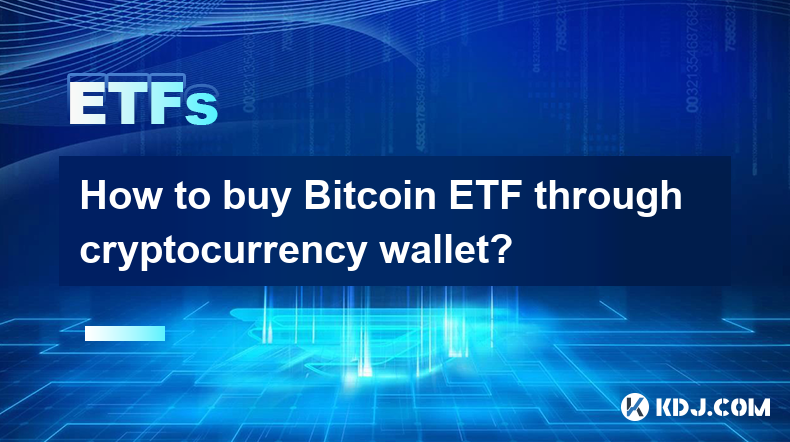
How to buy Bitcoin ETF through cryptocurrency wallet?
Mar 30,2025 at 08:22pm
It's important to understand that you cannot directly buy a Bitcoin ETF through a cryptocurrency wallet. Cryptocurrency wallets are designed to hold and manage digital assets like Bitcoin itself, not exchange-traded funds (ETFs). Bitcoin ETFs are traded on traditional stock exchanges, not decentralized cryptocurrency exchanges. Therefore, the process i...
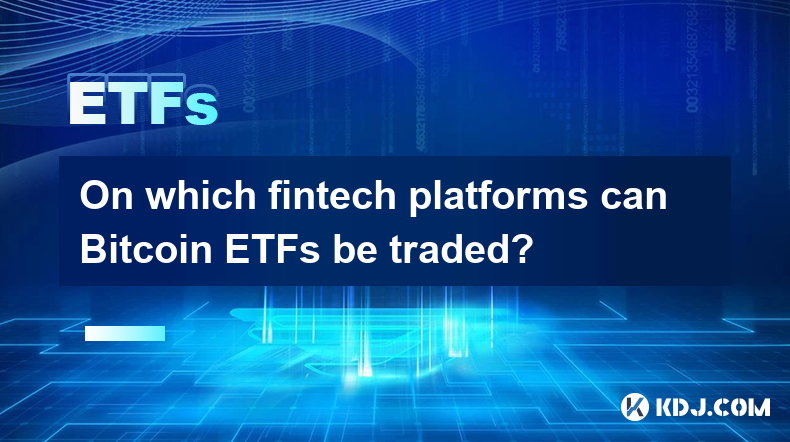
On which fintech platforms can Bitcoin ETFs be traded?
Mar 28,2025 at 09:21am
Navigating the Bitcoin ETF Landscape on Fintech PlatformsThe availability of Bitcoin ETFs on fintech platforms is a rapidly evolving landscape. Currently, the approval and subsequent listing of Bitcoin ETFs are subject to regulatory hurdles and vary significantly by jurisdiction. Therefore, the specific platforms offering Bitcoin ETF trading depend hea...
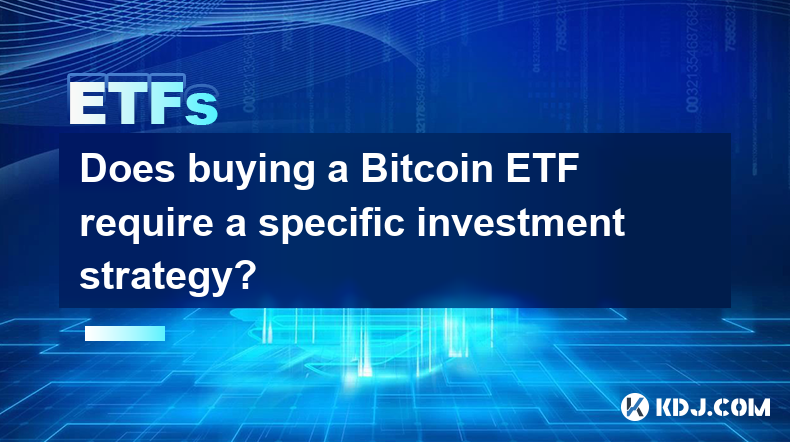
Does buying a Bitcoin ETF require a specific investment strategy?
Mar 27,2025 at 06:36pm
Understanding Bitcoin ETFs and Investment StrategiesA Bitcoin Exchange-Traded Fund (ETF) is a type of investment fund that tracks the price of Bitcoin. Investing in a Bitcoin ETF offers exposure to the cryptocurrency market without the complexities of directly owning and securing Bitcoin. However, like any investment, a successful strategy requires car...
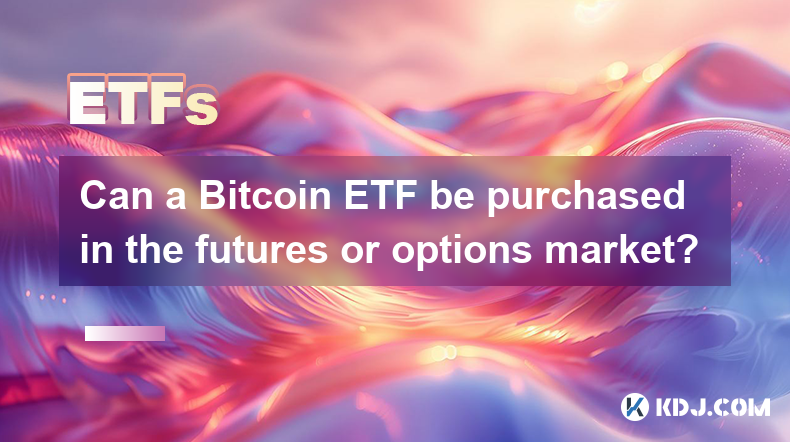
Can a Bitcoin ETF be purchased in the futures or options market?
Mar 27,2025 at 02:49am
Understanding Bitcoin ETFs and Derivative MarketsA Bitcoin ETF (Exchange-Traded Fund) is a fund that tracks the price of Bitcoin. Unlike directly buying Bitcoin, an ETF offers a more regulated and accessible way for investors to gain exposure to the cryptocurrency market through traditional brokerage accounts. However, the availability of a Bitcoin ETF...
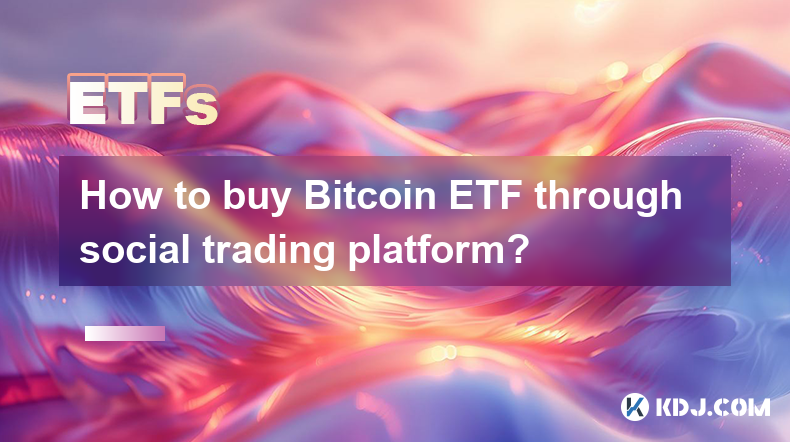
How to buy Bitcoin ETF through social trading platform?
Mar 27,2025 at 10:43am
How to Buy Bitcoin ETF Through Social Trading Platforms? Understanding Bitcoin ETFs and Social TradingA Bitcoin ETF (Exchange-Traded Fund) is a fund that tracks the price of Bitcoin. Unlike directly buying Bitcoin, an ETF offers a regulated and potentially less volatile way to gain exposure to the cryptocurrency market. This is because ETFs are traded o...
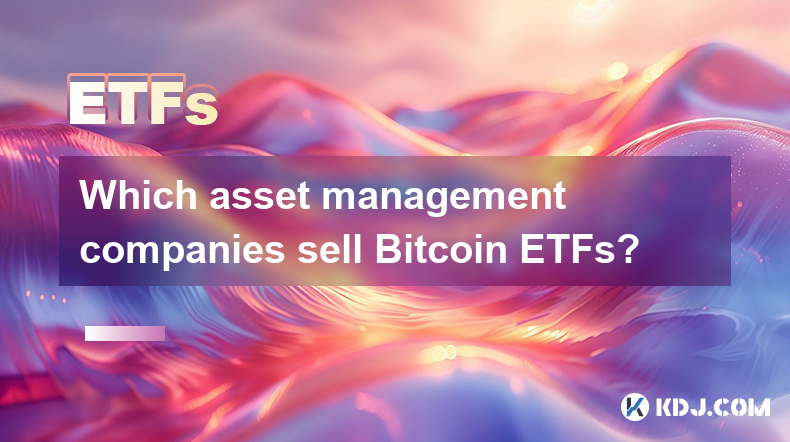
Which asset management companies sell Bitcoin ETFs?
Mar 28,2025 at 02:21am
The Current Landscape of Bitcoin ETF OfferingsCurrently, no asset management company offers a fully-fledged, SEC-approved Bitcoin ETF in the United States. While several companies have filed applications, the Securities and Exchange Commission (SEC) has yet to approve any. This is primarily due to concerns surrounding market manipulation, investor prot...

How to buy Bitcoin ETF through cryptocurrency wallet?
Mar 30,2025 at 08:22pm
It's important to understand that you cannot directly buy a Bitcoin ETF through a cryptocurrency wallet. Cryptocurrency wallets are designed to hold and manage digital assets like Bitcoin itself, not exchange-traded funds (ETFs). Bitcoin ETFs are traded on traditional stock exchanges, not decentralized cryptocurrency exchanges. Therefore, the process i...

On which fintech platforms can Bitcoin ETFs be traded?
Mar 28,2025 at 09:21am
Navigating the Bitcoin ETF Landscape on Fintech PlatformsThe availability of Bitcoin ETFs on fintech platforms is a rapidly evolving landscape. Currently, the approval and subsequent listing of Bitcoin ETFs are subject to regulatory hurdles and vary significantly by jurisdiction. Therefore, the specific platforms offering Bitcoin ETF trading depend hea...

Does buying a Bitcoin ETF require a specific investment strategy?
Mar 27,2025 at 06:36pm
Understanding Bitcoin ETFs and Investment StrategiesA Bitcoin Exchange-Traded Fund (ETF) is a type of investment fund that tracks the price of Bitcoin. Investing in a Bitcoin ETF offers exposure to the cryptocurrency market without the complexities of directly owning and securing Bitcoin. However, like any investment, a successful strategy requires car...

Can a Bitcoin ETF be purchased in the futures or options market?
Mar 27,2025 at 02:49am
Understanding Bitcoin ETFs and Derivative MarketsA Bitcoin ETF (Exchange-Traded Fund) is a fund that tracks the price of Bitcoin. Unlike directly buying Bitcoin, an ETF offers a more regulated and accessible way for investors to gain exposure to the cryptocurrency market through traditional brokerage accounts. However, the availability of a Bitcoin ETF...

How to buy Bitcoin ETF through social trading platform?
Mar 27,2025 at 10:43am
How to Buy Bitcoin ETF Through Social Trading Platforms? Understanding Bitcoin ETFs and Social TradingA Bitcoin ETF (Exchange-Traded Fund) is a fund that tracks the price of Bitcoin. Unlike directly buying Bitcoin, an ETF offers a regulated and potentially less volatile way to gain exposure to the cryptocurrency market. This is because ETFs are traded o...

Which asset management companies sell Bitcoin ETFs?
Mar 28,2025 at 02:21am
The Current Landscape of Bitcoin ETF OfferingsCurrently, no asset management company offers a fully-fledged, SEC-approved Bitcoin ETF in the United States. While several companies have filed applications, the Securities and Exchange Commission (SEC) has yet to approve any. This is primarily due to concerns surrounding market manipulation, investor prot...
See all articles























































































